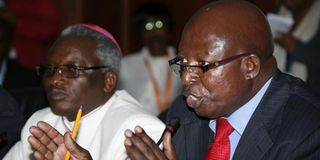Now House team orders probe into tetanus vaccine

Catholic Doctors Association chairman Stephen Karanja (right) and Catholic Health Commission of Kenya chairman Paul Kariuki Njiru during the hearing by the House Health Committee at Continental House in Nairobi on November 11, 2014. PHOTO | EVANS HABIL |
What you need to know:
- The ruling came after the church on Tuesday presented to Parliament the results of tests it said proved that there was a conspiracy to secretly sterilise Kenyan women.
- A panel of the church’s medical experts says the vaccine is laced with a human hormone which will make it impossible for women who have been vaccinated to have children.
A parliamentary committee on Tuesday ordered an investigation into a vaccine which the Catholic Church claims is being used to secretly sterilise women.
Dr Robert Pukose, the chairman of the House Committee on Health, asked for the investigation after observing that the Ministry of Health and the church appeared to get different results from samples tested.
The ruling came after the church on Tuesday presented to Parliament the results of tests it said proved that there was a conspiracy to secretly sterilise Kenyan women.
In an attack on the Ministry of Health and its partners, the Catholic Church said the ministry was either “incapable or unwilling” to act to stop the “permanent poisoning” of women through the tetanus vaccine.
A panel of the church’s medical experts says the vaccine is laced with a human hormone which will make it impossible for women who have been vaccinated to have children.
The health committee of the Kenya Episcopal Conference tabled the results before the National Assembly’s Committee on Health showing that samples of the government-administered vaccine contained the hormone called Beta human Chorionic Gonadotrophin, or HCG.
The Catholic Church has some standing on healthcare matters, being a provider of medical and training services to thousands.
It runs 58 hospitals, 83 health centres, 311 dispensaries and 18 medical training colleges.
POPULATION CONTROL
Its suspicion of vaccines from the World Health Organisation stems from the church’s belief that the organisation has been trying to use vaccines as a means of population control since 1972.
It claims that similar tetanus vaccination drives have been used to secretly sterilise women in the Philippines, Mexico and Nicaragua.
Catholics have a history of fighting the tetanus vaccines and in 1995 succeeded in stopping such a campaign.
Their fury with the Health ministry is founded on its alleged refusal to test the vaccine for the hormone, which causes miscarriages.
Bishop Paul Kariuki Njiru, the chairman of the church’s health committee, said: “We acquired several vials of the vaccine from Batch 12 which we sent to four credible unrelated government and private laboratories in Kenya. They all show that indeed the vaccine was laced with the hormone.”
Batch 12 is the lot of vaccines now being administered.
Dr Stephen Karanja of the Kenya Catholic Doctors Association said: “The hormone, Beta HCG is neither a by-product of nor a component required for the manufacture of the tetanus vaccine. It being part of the tetanus vaccine is nothing short of a scheme to forcefully render our women incapable of bearing children.”
CONDUCTED THEIR TESTS
The Catholics identified the laboratories, which conducted their tests, as the University of Nairobi College of Health Sciences, Lancet Kenya, Mediplan Dialysis Centres, and METR POLIS Star Lab.
Samples were obtained from Mombasa, Kilifi, Trans Nzoia, Narok and Kajiado.
The vaccination campaign targeted 16 counties: Mombasa, Kilifi, Baringo, West Pokot, Turkana, Marsabit, Garissa, Wajir, Mandera, Trans Nzoia, Uasin Gishu, Meru, Narok, Kajiado, Samburu and Laikipia.
According to the ministry, these areas were picked because home deliveries were common and the risk of contracting tetanus during birth was high.
A child dies of tetanus in Kenya every day, according to the ministry. And a child dies every nine minutes globally of neo-natal tetanus.
During the hearing, Dr Pukose asked the church why it did not take its samples to the Kenya Medical Research Institute, the government’s premier medical research facility.
Dr Karanja responded that it was a simple test that any chemist could carry out.
Dr Pukose noted that both the ministry and the church gave samples to Lancet Kenya and each got a different result.
The church questioned why the vaccination targeted women in the child bearing age bracket of between 14 and 49 years, leaving out boys and men who, it claimed, are more prone to tetanus than women.
Dr Collins Tabu, Head of the Immunization Technical Group at the ministry, said the objective of the campaign was to protect newborns from tetanus, as they would get immunity from their mothers who had been vaccinated.
The focus is therefore on expecting mothers and women with the potential to get pregnant.
He dismissed as “invalid in their entirety” the results obtained by the church on samples tested.
“Were the samples sent to the labs indeed vaccines? Were they sent in their primary containers and what was their condition of storage? What type of tests was run on them?
“Vaccines can only be tested at two centres, the Pharmacy and Poisons Board and Kemri, they have the capacity for the tests. They used macines that test blood and not vaccines,” he argued.





